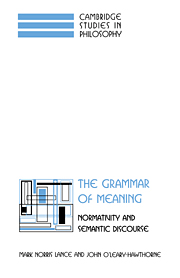Introduction
Published online by Cambridge University Press: 05 December 2011
Summary
PHILOSOPHICAL ACCOUNTS OF MEANING
Daniel Dennett once invited us to consider super-Martians who were highly advanced scientifically yet lacked all intentional concepts. They spoke the language of austere physics and were capable of perceiving and describing the world at the micro-level. If such beings could accurately report happenings in their environment, make predictions, and generally live out their lives wholly within the scientific image, what would they be missing, Dennett wondered, by virtue of lacking intentional concepts? Dennett's answer was that they would miss out on various higher-level patterns, describable by way of mentalistic and semantic vocabulary. Such patterns are available to us by virtue of our understanding of such vocabulary, and we rely inescapably on it.
Such an answer, in outline, is fairly standard today. That is, it is fair to say that the general consensus in modern philosophy is that semantic talk – to focus on the species of concern to us – is descriptive of some sort of high-level pattern. There is, to be sure, a fair range of disagreement as to what sort of pattern it is. For some (Field, Devitt) it is a pattern of causal relations between humans, their language, and macroscopic objects; for others (Putnam at one point, Lycan) it is purely the functional organization of individual thought, while various philosophers extend this individualism to include either relations to external objects (Putnam at another point), or relations among the people in one's society (Burge, perhaps Sellars, and Putnam at yet a third point).
- Type
- Chapter
- Information
- The Grammar of MeaningNormativity and Semantic Discourse, pp. 1 - 16Publisher: Cambridge University PressPrint publication year: 1997



